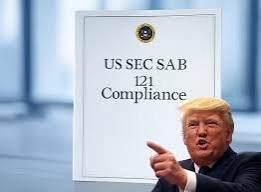
The US Securities and Exchange Commission (SEC) has officially rescinded Staff Accounting Bulletin (SAB) 121, a contentious rule that required banks holding cryptocurrency to classify them as liabilities on their balance sheets. The decision, announced on January 23, follows the resignation of former SEC Chair Gary Gensler, whose tenure had been marked by heavy criticism from crypto advocates and lawmakers.
The newly issued SAB 122 states that the previous interpretive guidance of SAB 121 has been revoked. The SEC emphasized that entities must now determine liabilities related to safeguarding risks using broader, pre-existing accounting standards rather than the rigid framework imposed by SAB 121.
The SEC further clarified that entities must retroactively apply this change for annual reporting periods beginning after December 15, 2024. Vanessa A. Countryman, the SEC Secretary, confirmed that SAB 122 will replace SAB 121 in the regulatory framework.
Pushback Against SAB 121
SAB 121 had faced intense opposition from both regulators and industry leaders, who argued that the rule stifled innovation and imposed unnecessary burdens on banks and financial institutions.
SEC Commissioner Hester Peirce, a vocal critic of SAB 121, celebrated its repeal. “Bye, bye SAB 121! It’s not been fun: SEC,” she wrote on X (formerly Twitter). Peirce had previously referred to the rule as a “pernicious weed,” criticizing Gensler’s unilateral approach. She argued that sweeping regulations like SAB 121 should be developed and approved by the full Commission, not dictated by staff reporting solely to the chair.
Lawmakers also expressed frustration over the rule’s impact. Senator Cynthia Lummis, an outspoken advocate for digital assets, called SAB 121 a “disastrous policy” that hindered the US banking sector’s ability to innovate and adopt cryptocurrency. “I am thrilled to see it repealed and to get the SEC back on track to fulfilling its intended mission,” Lummis wrote on X.

Political Battle Over SAB 121
The revocation of SAB 121 comes after a prolonged political struggle. On May 16, 2024, the US Senate voted to overturn the accounting bulletin, reflecting bipartisan dissatisfaction with its restrictive implications. However, President Joe Biden vetoed the resolution, defending the rule as a product of the SEC staff’s “considered technical judgment.”
Despite Biden’s support for SAB 121, crypto industry leaders continued to push for its repeal. Circle CEO Jeremy Allaire was among the most prominent critics, describing the rule as “punitive” and a significant deterrent for banks and financial institutions considering holding crypto assets. Speaking at the World Economic Forum in Davos, Allaire predicted that the SEC would eventually retract the guidance, calling it an unnecessary barrier to progress.
Allaire also expressed optimism about the regulatory environment under President Donald Trump’s administration, suggesting that Trump might take further actions to encourage a more favorable framework for cryptocurrency innovation.
The Impact of SAB 121 and Its Repeal
The implementation of SAB 121 had far-reaching consequences for the banking and cryptocurrency industries. By requiring banks to classify crypto assets as liabilities, the rule discouraged many institutions from engaging with digital assets. Critics argued that the guidance reflected a misunderstanding of crypto’s role in the financial ecosystem and disproportionately targeted an emerging technology sector.
The repeal of SAB 121 signals a shift in regulatory priorities at the SEC, particularly following Gensler’s departure. This decision is likely to encourage greater institutional adoption of cryptocurrencies by removing one of the most significant accounting obstacles.

Looking Forward: What SAB 122 Means for the Industry
Under SAB 122, the SEC has opted for a more flexible approach, allowing entities to assess safeguarding risks under existing accounting standards. This shift reflects a broader trend toward regulatory frameworks that balance innovation with risk management rather than imposing sweeping restrictions.
As the crypto industry navigates a new chapter, industry leaders and regulators alike will watch how these changes affect institutional participation, market stability, and the US’s position as a hub for cryptocurrency innovation. For advocates like Hester Peirce and Cynthia Lummis, the repeal of SAB 121 is a victory—but the future of crypto regulation will likely remain a contentious and evolving landscape.